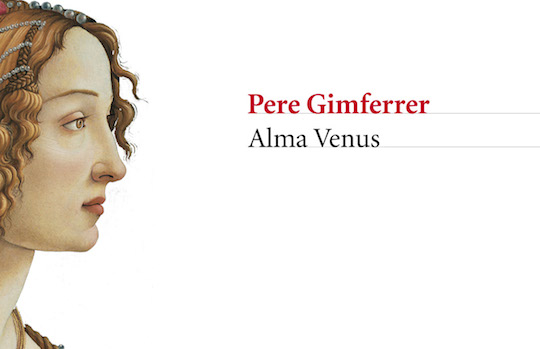Alma Venus, a long poem in two parts by Spanish and Catalan writer Pere Gimferrer, translated by Adrian West, is now available from Antilever Press. Gimferrer’s creative work appeared in English translation for the first time in Asymptote’s January 2013 issue, after which Adrian West began translating Alma Venus. Gimferrer’s work has been awarded the National Prize of Spanish Letters (1998), the Reina Sofia Prize for Iberoamerican Poetry (2000), and the Octavio Paz International Poetry and Essay Prize (2006).
From Alma Venus, First Book
Every poem has a single theme:
How the word says something else.
The sparrow hawk lives blind and serene
In the murk of the final words.
I walked on these streets in the years
When my youth was a dead she-wolf,
But they were unreal, not drawn out
Yet, or drawn out and entombed.
They watched me with painted eyes
Or from photos incandescent
Those streets today blurry, clear,
At the same time narrow and precise:
They are in the past and today I cross them,
In a sheet draped, chasing myself.
Everything is a pact of irreality:
The serenade of the rosebush of time.
I will see myself unfolded, on turning this corner
As in the Rinascente department store
One afternoon in Turin made of plaster
In the dark grisaille of the porticoes.
(Then I remembered it was carnival,
Seeing lights in the February snow.)
Hunters of the hunter,
We crouch, loggia to loggia, corner
To corner, mercury zigzag
That slips through my hands, my years.
Like a gargoyle in the Piazza Solferino,
The mask of my yesterday looks at me.
To have reached the end of the road:
The moon could linger in the end.
The poem, a mosaic of voices:
All poems are a single voice
That murmurs words wearing makeup,
The smeared eyeshadow in the voiceless light,
The wave that arriving departs.
The predella of Urbino is the shuttering
Word of Paolo Uccello:
Shadows of quicksilver, incensing light
In the muzzle of air in flames.
But the predella is not a rampart;
The heirloom’s absolute word,
The waxen gloss of clarity.
***
All that pisses me off!
Jean Genet
Urganda the unknown? Not at all:
In a separate claim, Palma Arena,
Packages stuffed with brass and straw
And the larceny that shines in the night;
Rag-and-bone men the color of lead
And a pansy with pupils of blue.
The marauders of light
Wed not the figurines,
With the display window papered over.
The country of foam’s terracotta
Sees not the gold braids of sawdust,
The saturning nocturne of werewolves,
The rabble of scoundrels,
The scramble of the blue of the sky.
Joan Miró lived by this sea:
That is why we watch our words,
So as not to make peace with paper money,
With the veterinary of chemists and fodder.
Death in a Tyrolese hat
In the hills the color of hay,
Death with his vagabond eyes,
Will discover the asps of the day,
The Cleopatra in the suburb of tango
Touched with the picture hat with the plumage of toucan.
Our Homer will be Santos Discépolo
(Or perhaps he will be our Juvenal?).
The landscape has a date of expiry:
A suspension, between two wars,
A vacated instant of basil,
As well as discolored thyme,
Full sunlight with an odor of cyanide.
Flatland distant, instance annoying.
More tiresome than fatal: landscapes
For a panoply of scrapyards.
The deadly cavalade of memories,
The pink trophy table of non-being.
Each word, bereft of meaning,
Is only the clamor of secondaries,
The hoarse caw of scrap-dealers,
An exchange of falsifications:
The rube and the ha, the gullible’s fair,
Of card-sharps and number-runners, nothing more.
Death of Blas de Otero in the summer sun:
The dignity of the word on foot.
Yes, the rest is excess. The bowspirit pushes on,
Death ahead, for poetry:
Manifestly leads to the prow the eyes of living.
Alma Venus: love, revolution.
***
Read Adrian West’s translation of Pere Gimferrer in Asymptote Journal here.
***
Pere Gimferrer is the author of numerous books of poetry, criticism, and fiction, both in Spanish and in Catalán. His writing is notable for its visual power, the range of its references, and its extraordinary lexical refinement, as well as a profound concern with the role of the artist in his engagement with his forebears and the historical responsibility of the intellectual.
Adrian West is a contributing editor at Asymptote. His translations include the long poem cycle Alma Venus by Pere Gimferrer and Büchner-prize–winning novelist Josef Winkler’s Natura Morta and When the Time Comes. His essays, translations, and short fiction have been published in numerous print and online journals, including McSweeney’s, 3:AM, and Words Without Borders. He lives with the cinema critic Beatriz Leal Riesco.

